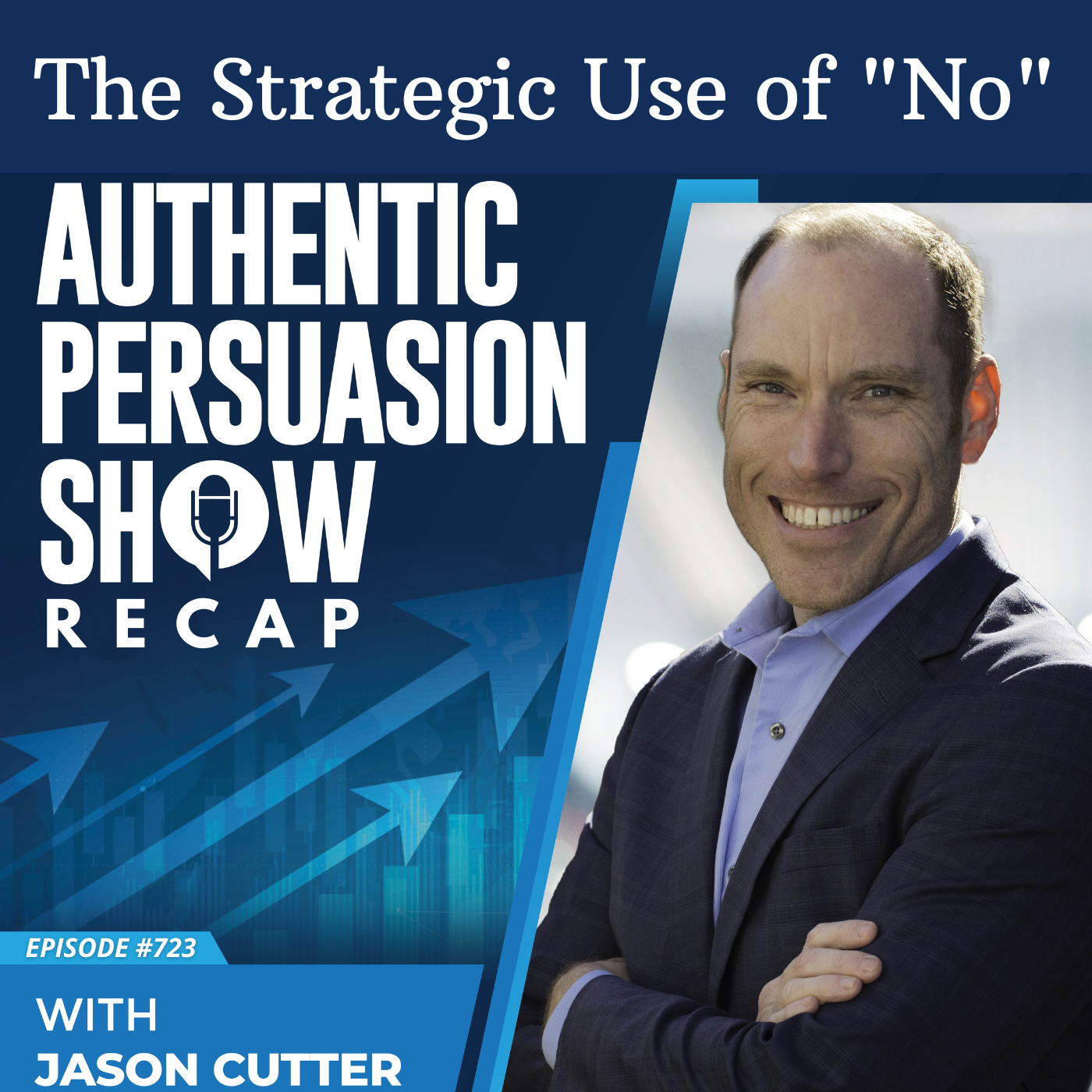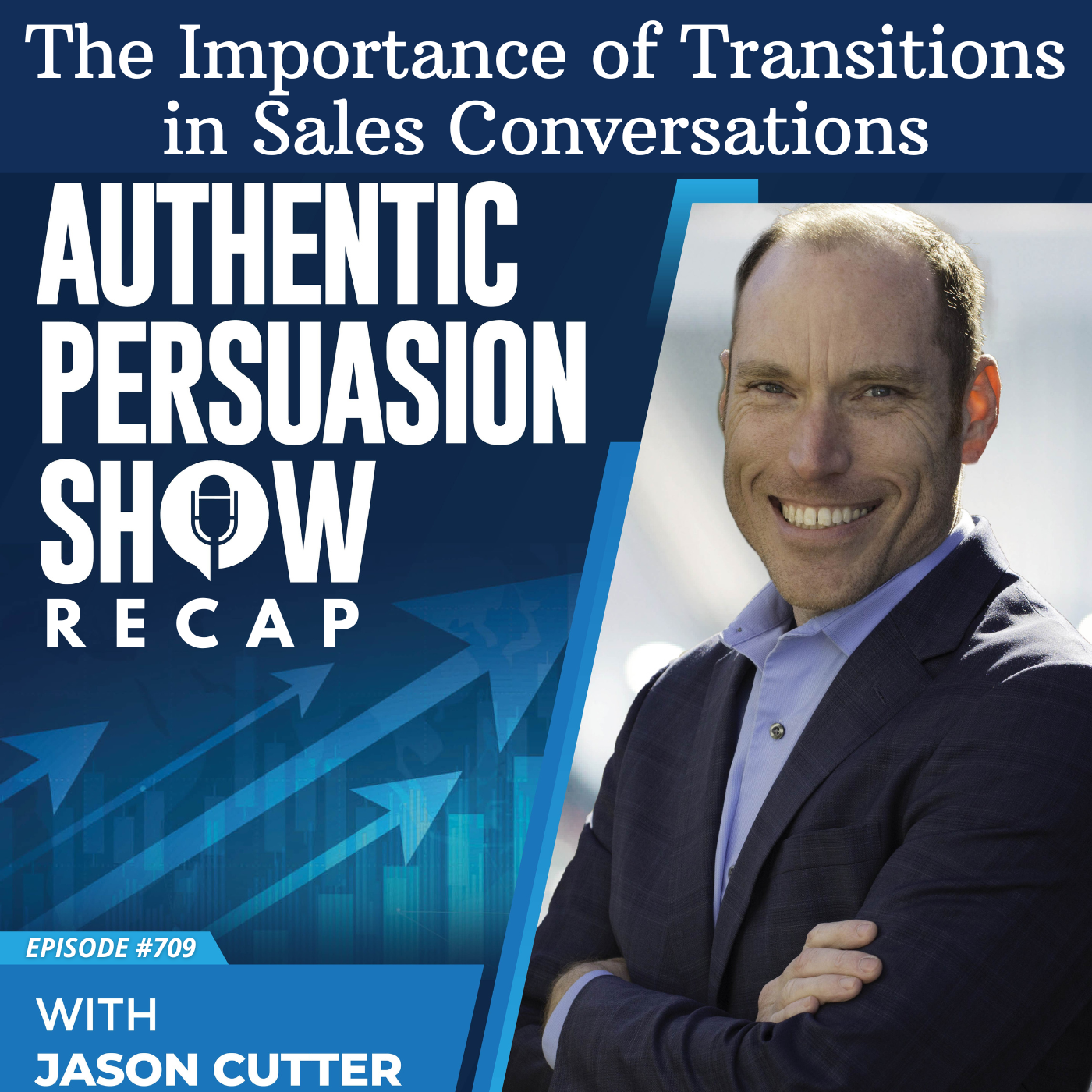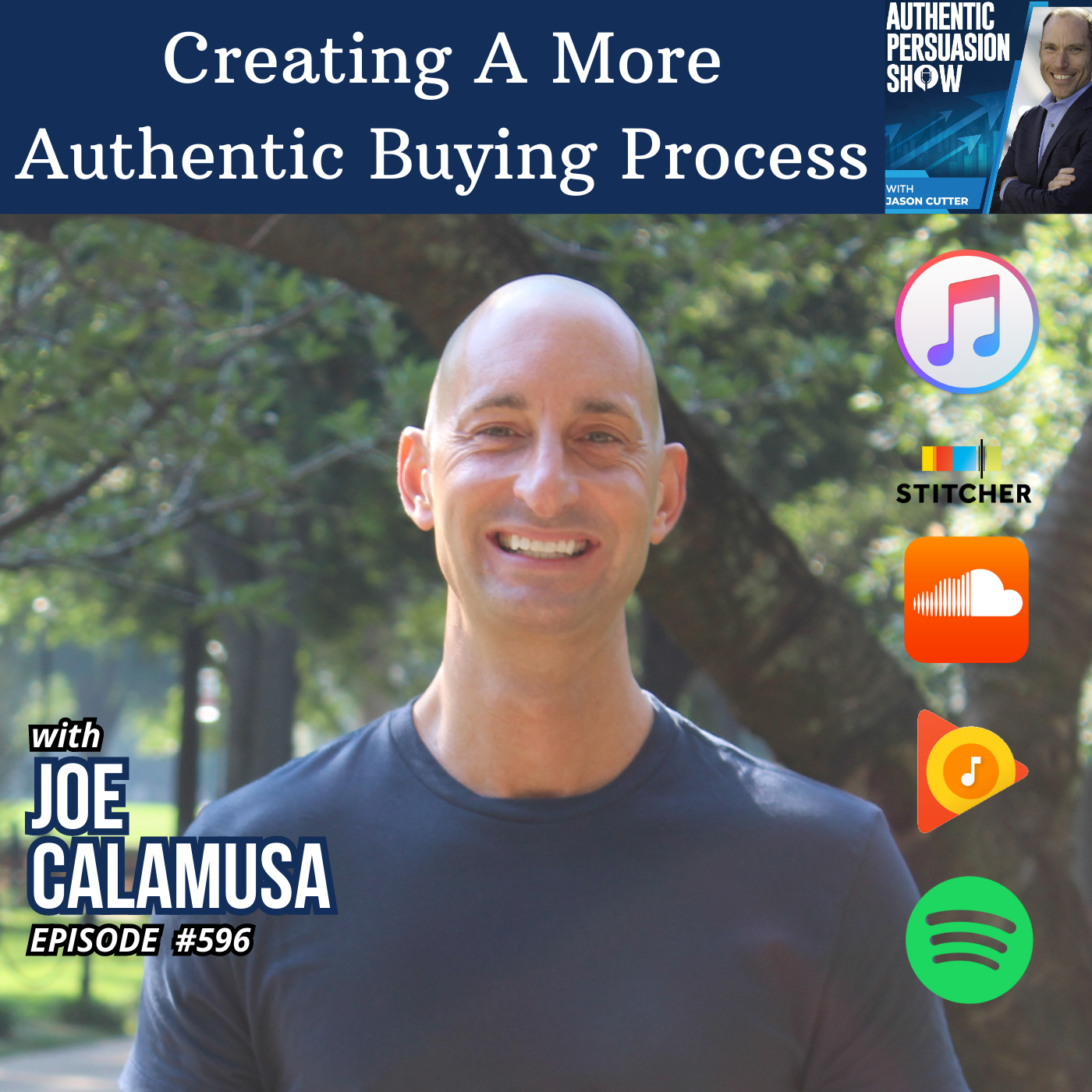Episode Transcript
The most important thing to understand is that nobody cares about you or your service or your product. Literally nobody cares. Welcome to the sales experience podcast, the show for salespeople and sales leaders, where we help you create the ideal sales experience to generate raving fan customers. Grab your notepad and get ready for actionable steps.
You can use to change sales from a dirty word to an active service for your prospects. Now for your host, Jason Cutter.
Welcome to season three of the sales experience podcast. I am your host, Jason Cutter. By tuning in, you're now on a journey to help sales people and teams transform the way they sell such that they're providing an amazing. Sales experience to customers as well as for themselves. So this isn't about making other people feel good at the cost of your wellbeingIt's about both. It's about an and conversation, not an or conversation. If this is the first time you're tuning in, welcome. So glad that you're here. If you've downloaded episodes in the past, welcome back. Whether it was a few or all 220 from the previous two seasons. I want to start this episode with a little recap.
So like TV shows. When they kick off a new season, which I'm doing here, I want to talk about what's happened in the previous seasons, previous episodes, so that you know what happened, what you can go back and find, and then where we're picking up now in our journey together. So in season one, I focused on sharing a lot of what I know and have been in seeing in sales and what works and what doesn't.
If you're looking for sales tips, strategies, or ways to improve each week had a theme. So it's easy to find a topic that would help you right now, or you can tear through the whole season. And a lot of those things are coming from 17 years in sales and sales leadership and applies to pretty much any sales industry, any role that you have.
For you and or for your team. So there was also a lot of amazing guests during season one. And if you know anything about me or if you caught any of those, I don't enjoy pure interview shows where it feels very structured, very regimented. And it seemed like there's questions that had to be asked. So these are way more conversational than structured.
So check those out. Those are bonus episodes outside of my normal. Shorter episodes, a lot of great guests, and I highly recommend all of those episodes. Now, in Season 2, I went more towards guest episodes. The expectation that I've always set with my listeners, and what I prefer when I'm listening to podcasts, is that the episodes would be under about 15 minutes long.
For the guest episodes during Season 2, You'll notice that they were published as miniseries, which I know is not a word, but I couldn't think of something else. So like a miniseries, again, they're great, wide variety of guests from consultants to sales leaders, to marketers, to sales tech companies, to outsourcing consultants.
Check it out. Use it as a resource for anything that might help you or your team. Literally can go in there. They're all labeled and titled appropriately for what we talk about on those guest miniseries. And you can find something that could help you apply to you and your success in the moment. Now let's talk about season three.
What will that sound like? What will this be like together? So my goal It's still shorter episodes, five days a week. My goal is still the same, which is to provide as much value as I can packed into each episode to help you in some way in your selling effectiveness. And I'm going to do my best to be as powerful and short and succinct that I can and give so much value in many different ways.
And one of the things that I've been doing is I've been collecting a lot of questions and topic ideas from salespeople and sales leaders. What I'm going to do is take recordings of me addressing those sales related challenges that I have done for other purposes. And then I am going to share those on the podcast so you can hear those responses in case you didn't catch them in other ways.
And then other times I'm going to record something specifically for the podcast and what comes up. I'm also going to take a lot of topics that are popping up that I'm seeing and talk about those relevant to the situation, especially right now with the COVID lockdown shelter in place, economic changes that have been happening and what seems to continue to evolve.
I'm seeing a lot of companies. Who are successful, a lot that are struggling salespeople on both sides of the fence and what I have found and what I'm collecting from people as to what's working and what's not working. So I'm going to share as much of that as I can in these episodes. I'm also going to continue having guests.
In fact, I have some lined up. We've recorded some episodes coming out soon that wide variety of guests where they have these experiences in different walks of life, whether it's sales or not, and bringing it in to help you and provide value to you. Because one of the big things is it's not always just about listening to someone talk about sales.
It could be psychology. It could be storytelling. It could be mindset and mental health. Cover a lot of that as much as I can with guests. And if you're a long time listener, you'll notice that I have included more calls to actions in these episodes. My evolution with the podcast is about helping more people with their sales effectiveness.
First, it was educating. And now it's time to take action. And so I've been creating courses, programs. I've started a one on one training program or coaching program with salespeople, group coaching programs with people and or teams and companies. If you're ready to get help with getting to the next level in your sales career.
Check out Jason cutter. com. Best way to find me and all the different ways to get ahold of me and all the resources that I'm adding on a constant basis. So one of the things about this COVID situation and not traveling more time to focus more time to build more time to impact salespeople in any way that I can.
So if you're looking for help, go to Jason cutter. com. Lastly, thank you for being here. Whether it's your first time listening, or this is truly episode 221 of your journey with me, listening to me talk about sales, I am always imagining that if you downloaded this episode, that you want to become a sales professional and impact your prospects and customers.
In a positive way. So thank you for your part in making the world a better place by doing sales the right way. That's it for my intro for season three. And now let's get to the topic with the rest of our time together today. All right. So I have one question here actually, that I want to answer today, and it comes from Eric Lawrence.
So connected with him on LinkedIn and he submitted this question. And in fact, I'll read the whole thing. So my biggest questions. Would be around getting access to decision makers. I worked in software sales to large corporations. So the perfect person evaluating the software is not the guy who signs the check.
And there are often multiple levels of approval required. How do you get access to the decision makers? And if you can't. How can you make sure the person you are talking to plans to champion your solution instead of your competitors? I see this all the time, obviously from the consulting side, from a business side, my own business, other clients, as well as just what I see online.
And this is a great question from Eric because this affects a lot of things. So how do you get ahold of the decision maker? Or how do you get the person you're talking to, to be that champion and really what it is and what it comes down to is understanding who you're calling individually. So that business, right?
Account based marketing, ABM is one term for it, but understanding that company, that business, especially if you're going after larger accounts, but who are they, what do they do? And then of course, depending on how far you go into account based management. Who it is, what they do, and what do they currently have in place that you're trying to either improve upon or replace.
Okay? So if you're selling marketing solutions, then what are they currently doing for marketing? How is that going? What technology are they currently using? And are you trying to get them to change their mind and dump a previous vendor that they're working with to go with something new? Or you're trying to enhance what they have.
Obviously, enhancing is always easier to get your foot in the door instead of replacing the incumbent technology or service provider or whatever that is. The key is that you've got to know who they are, and then you've got to know the value you provide and what that return on investment is to that company.
So what does it mean if they use your platform? They buy your service. What will that do for them and how we'll improve their business in what ways in all the ways that it will, because there's got to be that return on investment. Is it going to help them generate more leads? What's the cost per lead cost per acquisition?
If it's a software platform for CRM, like productivity efficiency, what is that going to do for them? How is it going to help? We're talking about the champion. So that's the decision maker. And then you want to get a touch of the decision maker. Also play the long game. Like I was talking about, and this is why I picked this question for today when we're talking about reasonable and unreasonable people, keep in mind that business owner, they got to that point because they run a business, they make decisions, they've grown something such that you want to sell them something else, right?
So they've been successful at some level, and you've got to keep in mind that A They're the type of person that makes decisions. That's why they've grown this company. That's why they've achieved what they have. Fundamentally, it means that they have made decisions and they are successful to that level, right?
Whether it's two employees or a hundred employees, doesn't matter. They've reached some level of success based on their decision making ability. Now what you're trying to do is come in and tell them that they don't know everything or they're wrong because you're trying to sell them something else. And most people's egos won't like that business owners who feel like they know what they know, depending on how open minded they are.They really won't like it. So you've got to play the long game. You've got to provide lots of valuable content. You've got to show them that you are trying to help them not point out that they're doing anything wrong. Because if you do that, it's going to be a tough battle. So you want to give them information.
You want to play that long game, play the relationship game, and then also just give them as much value as you can, such that they will then realize, okay, this is something I need and wants. And you want to make it more their idea because that will really help obviously depends on personalities but it could be a tough battle if you go in there and tell them they need what you have.
They're going to tell you no because it's not their idea. Now let's talk about champions. So you want somebody to be the champion and how to get them to. Be that person who's going to sell you up the chain to the next person. The most important thing to understand is that nobody cares about you or your service or your product.
Literally nobody cares. And I know that hurts for some people. I tell people that all the time. And at first they the ego kicks in for them as well. The key is to keep in mind is nobody cares about your product or service. All they care about is themselves, right? What's in it for me? That's all they literally care about.
Now, that's not a bad thing. That's what you want. You're providing a service that's going to help them. It's going to do something for them. They don't care about you. They don't care about your brochures. They don't care about your elevator pitch or your features and your benefits and all blah, blah. Like they don't, they only care about what's in it for them.
And so what you want to do is you always want to make sure you understand the deepest level of value you're providing to that champion in their life and in their role. For example, let's say marketing software into a company and you're dealing with that marketing manager, that CMO, that. Director of marketing, whatever they might be.
And obviously they have to sell it and get approval. The key is you want to understand how what you have provides a solution for them in ways that would either benefit them in their career, in their life, or keep them from pain, right? So there's two main motivators is there's the hope for gain and there's the fear of pain.
Most people are more motivated by fear of pain. So what is that marketing person afraid of or worried about? Or what are they held to for their KPIs and their standards? And how can you solve that? You always want to know. Doesn't matter. We're talking about the champions here. You always want to know what keeps that other person up at night, what wakes them up at two o'clock in the morning, the cold sweat, and or what are they constantly thinking about or trying to stay ahead of that their manager or the owner is going to ask them about.
And they want to make sure they're on top of their game and they don't get in trouble. Is it a cost per lead cost per acquisition? Lead volume. Is it for sales? Whatever that looks like, whatever you're selling, you have to know what is in it for them, how it affects them at the deepest level possible, helps them be a superstar in their job, keep their job, reduce their stress, have a happier career there, make things easier in their life.
The more you can do that, the better and easier they will become a champion because literally they will want to own that solution. They will know how much it means to them, and then they will go up the chain and they will sell it all day because it's so valuable to them. They will easily go to an owner and say, I want to have us buy this product, buy this service because it's going to do this, which affects my job, which affects the measurements that you've given me.
And then I will be successful in this role. So always make sure you make it about them. So many salespeople, especially business to business salespeople, especially big enterprise salespeople. They focus on themselves and their pitch and their monologue and how great they are and how great their company is and why they're the newest, greatest, shiniest tech platform or product or piece of marketing or new way to do this or that everyone's got that same pitch and nobody cares.
So make sure you focus about the other person, focus on the other person. Hopefully that helps. Eric, thanks for the question, and if you have questions, make sure to hit me up on Facebook. You can hit me up on LinkedIn. If you want to talk about sales for yourself or your team, you want to have your team focus on authentic persuasion, then go to jason cutter.com.
You can find the link on there for scheduling a free sales power call. You can find the Authentic Persuasion ebook, my LinkedIn, the podcast, all the links are on there. And I will see you soon.
![[E221] Welcome to Season 3](https://episodes.castos.com/salesexperiencepodcast/images/TSEP-Cover-221.png)


